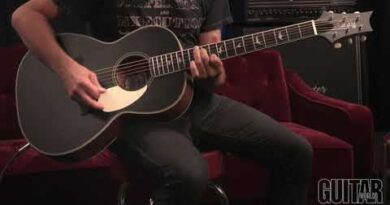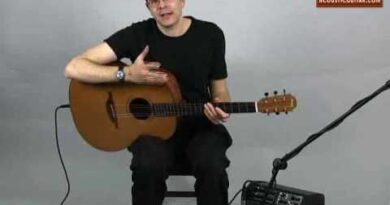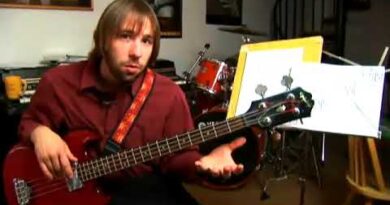SOLO PRACTICE TIPS FOR BASS GUITAR! | 251 Progression cont&’d ~ Daric Bennett&’s Bass Lessons
Start Your 3 Day Free Trial of Online Bass Lessons and Community here https://www.daricbennett.com/
Support this channel by becoming a Patron Here:
http://www.patreon.com/dblessons
Looper Pedal used in this Video: http://amzn.to/2rw7QDN
Hey my fellow bass players! In this lesson we’ll be discussing how to approach soloing over the 251 progression. This is a continuation of the original lesson, “The 251 Progression” expanding on what we’ve already learned and applying it to increase our improvisation skills and technique.
Take it slow and have fun guys!
#SOLO #PRACTICE #TIPS #BASS #GUITAR #Progression #cont39d #Daric #Bennett39s #Bass #Lessons
Originally posted by UCvUGrdDxtUBlxSi4Zl-HkqQ at https://www.youtube.com/watch?v=xs3POOlfdIY




This is a really, really useful clip to begin with soloing for bass. I feel I'm lucky to find this video today; Thank you so much!
At 10:30 min/sec of a 13 & 1/2 min video we begin the tutorial.
Basically this video is 10 1/2 minutes of how to play a major and minor chord, oh and Dom. 251 kids. However he is fighting a cold. While I'm fighting the compulsion to troll and failing.
And why does your hand wobble when sustaining a note. Don't say it's for vibrato because, shhhh,do you hear it. Nope, neither do I. If your going to do it do it. The visual asthetic without the sound is like, faking.
That's it!!!! It's over? Dude!
I just brought myself a bass guitar ???? where should I start by learning.
I find your videos to be very lucid and helpful as I'm trying to learn more and more.
Great lesson Darric Thank You!!! You´re an amazing teacher, love you!!!
How can this marvellous bass player gets thumbs down ???
Damn son … I think I ended up more confused from all the: eh no hmm that, no sorry the eh, yes.. eh but anyway 😀 😀 😀
This man got corona before it was cool (0:56)
I would maybe just run over 1 chord at a time on looper forever.
thanks to you Mr what a wonderful and understanding lesson
https://youtu.be/KXl5hszdOME
O man, i actually learned something essential here!!! This should get me closer to were i should be in terms of theory…
i've been learning my bass parts to songs with tabs from the internet. No thinking…just memorization. Soloing is going to change all that. And thanks for helping me find a way to another level.
You are great dude, you just describe in simple way how to do that stuff. Cheers!
One of the things that make me keep waiting for your next video is that you always use an affordable gear@bass rather than the high end bass@gear in your videos which completely wosh off the concept off better gear@bass will make you play better… you all know what I mean.. nice video daric
Just found you…have been trying to develope my soloing and this helped so much…subscribed and will have to check out more of your lessons. Thanks for a great lesson explained well and in a relatively simple manner!!
Brother Daric, please give me some advice on how I can learn the notes of the fretboard. I've gone through tons of youtube vids, but nothing is working. Any advice would help.
Thanks. -Phil, Naval Base Seal Beach, Ca
A slow tempo of the progression can give a larger space to voice the ii-v-I harmony..ie, 8 beats per chord.
That being said..we can use chord substitutions and their arpeggios, modal scales, plus different voicings ..to mix up note content/color per chord as the ii-V-I harmony progresses…for soloing, using 16th notes as a pulse
So the ii-V-I modes, arpeggios, and scale fragments, can be cycled through the circle of fourths and fifths , also as an excircise..a pallette..of harmony AND melody as a progression moves harmonically towards the end of the improv, practice, composition…or even lesson????.
The ii-V-I can be exploded to I-vi-ii-V-ii-vi .
Then subdivided into modes , scale fragments, and arpeggios per interval of the progression , using 16th notes as a pulse within a slow tempo using 4/4 time.
All of the harmonic/melodic subdivisions can then be cycled through the circle of fourths and fifths…for even MORE sonic territory to carve your solos through.
We can break up progressions into modal scales.
We can subdivide the chords by using its vi minor(relative).
We can use arpeggios , scale fragments, and chord inversions for more color while progression moves.
We can bundle all of this while cycling through the circle of fourths and fifths.
…or any progression.
** Progressions within progressions, using chords within chords..cycling through fouths and fifths ..
..is what im trying to convey.
**This is what my point is.
**We can map out all this territory and just blaze through melody/harmony though circle of 4ths and 5ths.
Yo d wht is the lick @ the end of.the video it is the music at the begining thx
Pls Bennet for some of us that are new in Bass Pls call the note for us so that we will know how to practice it thank you so much
GREAT DARIC
I can't wait to use this lick on my next gig….update.. I was fired for overplaying
Great lesson, I rec'd so much from it. Thank you.
i got the same squier in red, it's awesome
Great the groove, Daric. Very nice!
What city are you from. . I would love to visit and get one on one. . my new favorite BASSES
What's the track played at the end? Where can i listen to it in full?
Verry good Daric.